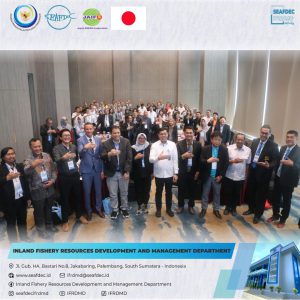SEAFDEC/IFRDMD Workshop Advances Regional Strategies to Combat Microplastic Pollution in Aquatic Systems
 The Southeast Asian Fisheries Development Center (SEAFDEC), through its Inland Fishery Resources Development and Management Department (IFRDMD), convened a regional workshop titled “Mitigation and Strategic Policy for Tackling Microplastic Pollution in Marine and Inland Fisheries across Southeast Asia” on July 2–3, 2025, in Jakarta, Indonesia. Themed “Advancing the Blue Economy through Strategies for Managing Plastic Pollution in Aquatic Systems,” the event aimed to strengthen regional policy frameworks and mitigation practices against microplastic pollution.
The Southeast Asian Fisheries Development Center (SEAFDEC), through its Inland Fishery Resources Development and Management Department (IFRDMD), convened a regional workshop titled “Mitigation and Strategic Policy for Tackling Microplastic Pollution in Marine and Inland Fisheries across Southeast Asia” on July 2–3, 2025, in Jakarta, Indonesia. Themed “Advancing the Blue Economy through Strategies for Managing Plastic Pollution in Aquatic Systems,” the event aimed to strengthen regional policy frameworks and mitigation practices against microplastic pollution.
The workshop brought together 40 in-person participants from the fisheries departments of Cambodia, Lao PDR, Myanmar, Malaysia, Thailand, and Indonesia, as well as representatives from the SEAFDEC Secretariat and its technical departments (TD, AQD, MFRDMD, IFRDMD). An additional 105 participants joined remotely, highlighting the region’s commitment to broad-based knowledge exchange.
Organized by SEAFDEC/IFRDMD with funding support from the Japan-ASEAN Integration Fund (JAIF), the workshop underscored the importance of synergy between regional institutions and international partners in addressing this transboundary challenge. It builds on SEAFDEC’s ongoing advocacy for sustainable fisheries through science- and policy-based approaches.
In his opening remarks, Mr. Andi Soesmono, Chief of SEAFDEC/IFRDMD, emphasized the urgent need to deepen regional understanding of microplastic sources, classification, and distribution. He encouraged the adoption of advanced analytical methods, toxicological studies, and the development of evidence-based mitigation policies to translate workshop insights into actionable strategies within member countries.
Mr. Koichi Tahara, Deputy Secretary-General of SEAFDEC, welcomed participants and highlighted the critical role of technical and policy collaboration between regional bodies and donor partners in enhancing analytical capacity and plastic pollution mitigation. The workshop was officially opened by Dr. I Nyoman Radiarta, Head of the Agency for Extension and Human Resource Development of Marine and Fisheries, Republic of Indonesia.
Keynote speakers included Prof. Dr. Muhammad Reza Cordova (BRIN Research Professor, Indonesia) on standard QA/QC protocols for microplastics; Prof. Dr. Agung Dhamar Syakti (Rector of UMRAH) on toxicology research frameworks; Mr. Christoffer Gronstad (NIVA) on river-flow modeling approaches; and Dr. Beta Susanto Barus (Sriwijaya University) on microplastic distribution data in Southeast Asia.
The workshop also showcased initiatives from Indonesia’s Ministry of Marine Affairs and Fisheries, including the national “Month of Ocean Love” campaign presented by Mr. Suryo Prasojo (Directorate General of Marine Spatial Management), the Plastic Reduction Program at Fishing Ports by Mr. Tri Yuwono (Secretariat General), and mitigation measures for abandoned and damaged fishing gear by Ms. Lingga Prawitaningrum (Directorate General of Capture Fisheries). Dr. Niken Gusmawati from the Ministry moderated the discussions.
Participants engaged in field visits to the Maritime Heritage Gallery, the Ministry’s Command Center, and the Nizam Zachman Fishing Port to observe marine debris management policies and microplastic monitoring in practice. These excursions provided practical context to the theoretical discussions and facilitated the exchange of implementation experiences.
The workshop reaffirmed that microplastic pollution poses a serious threat to ecosystems and human health, emphasizing the necessity of cross-border collaboration, technological innovation, and robust policy support to design holistic solutions. Outcomes from the workshop are expected to inform both national and regional policies for tackling plastic pollution in aquatic systems. SEAFDEC/IFRDMD remains committed to fostering ongoing dialogue, policy innovation, and solution implementation to ensure cleaner, healthier, and more sustainable inland and marine fisheries resources in the region.
